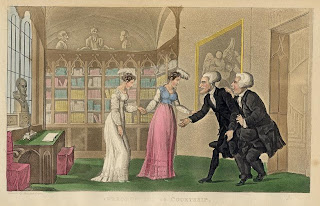Catastrophes, wars, terrorism, ecological disasters, deadly diseases, poverty .... The list of tragedies - both personal and public - is endless. Every day and hour media, politicians, experts - and charlatans - bring us a never ending barrage of bad things. No wonder that many people feel depressed and weary. This blog tries - in a modest and personal way - to contribute to a more balanced view. After all, there is so much to appreciate and enjoy in life ...
Saturday 26 February 2011
On conversation - some good advice from Jonathan Swift
Conversation should be pleasant without scurrility, witty without affectation, free without indecency, learned without conceitedness, novel without falsehood
William Shakespeare
Good conversation is one of the things that makes life enjoyable. Regrattably it also seems to be a vanishing art. The conversational deterioration may be linked to the ever faster lifestyle of ours - there seems not to be enough time for good conversation - and perhaps also to the new communications media, which occupy so much of our time now.
Be it as it may, it is interesting to note that there were voices lamenting the lack of good conversation already much before our time. Jonathan Swift, the Dean of St. Patrick´s Cathedral in Dublin (and, of course, the author of Gulliver´s Travels) noted a number of of these deficiencies in his "Hints Toward an Essay on Conversation".
Below is a selection of the observtions and comments that Swift makes in his essay. I think also you will recognize that not so many things have changed from Swift´s time (1667 - 1745):
"For instance: nothing is more generally exploded than the folly of talking too much; yet I rarely remember to have seen five people together, where someone among them has not been predominant in that kind, to the great constraint and disgust of all the rest."
"Another general fault in conversation, is that of those who affect to talk of themselves; some, without any ceremony, will run overr the history of their lives; will relate the annals of their diseases, with the several symptoms and circumstances of them; will enumarate the hardships and injustice they have suffered in court, in parliament, in love, or in law."
"Where a company has met, I often have observed two persons discover, by some accident, that they were bred together at the same school or university; after which the rest are condemned to silence, and to listen while these two are refreshing each other´s memorey, with the arch tricks and passages of themselves and their comrades."
"I know a man of wit, who is never easy but where he can ber allowed to dictate and preside: he neither expects to be informed or entertained, but to display his own talents."
"It now passes for raillery to run a man down in discourse, to put him out of countenance, and make him ridiculous; sometimes to expose the defects of his person or understanding; on all which occasions, he is obliged not to be angry, to avoid the imputation of not being able to take a jest."
"There are two faults in conversation, which appear very different, yet arise from the same root, and are equally blameable; I mean an impatience to interrupt others; and the uneasiness of being interrupted ourselves."
"There are some men excellent at telling a story, and provided with a plentiful stock of them, which they can draw out upon occasion in all companies, and, considering how low conversation runs now among us, it not altogetherr a contemptible talent; however, it is subject to two unavoidable defects, frequent repetition, and being soon exhausted; so that, whoever values this gift himself, has need of a good memory, and ought frequently to shift his company."
"The degeneracy of conversation, with the pernicious consequences thereof upon our humours and dispositions, has been owing, among other causes, to the custom arisen, for some time past, of excluding women from any share in our society, farther than in parties at play, or dancing, or in the pursuit of an amour. I take the highest period of politiness in England (and it is of the same date in France) to have been the peacable part of King Charles I´s reign; and from what we read of those times, as well as from the accounts I have formerly met with from some who lived in that court, the methods then used for raising and cultivating conversation were altogether different from ours; several ladies, whom we find celebrated by the poets of that age, had assemblies at their houses, where persons of the best understanding, and of both sexes, met to pass the evenings in discoursing upon whatever agreeable subjects were occasionally started; and although we are apt to ridicule the sublime platonic notions they had, or personated, in love and friendship, I conceive their refinements were grounded upon reason, and that a little grain of the romance is no ill ingredient to preserve and exalt the dignity of human nature, without which it is apt to degenerate into everything that is sordid, vicious, and low."
(image by antiqueprints.com)
PS
This article on the art of conversation, published in the December 19 2006 issue of The Economist is well worth reading.
Labels:
Literature
Subscribe to:
Post Comments (Atom)


No comments:
Post a Comment